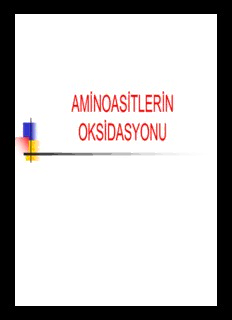
Amino Acid Degradation PDF
Preview Amino Acid Degradation
AMİNOASİTLERİN OKSİDASYONU AMİNOASİTLERİN METABOLİZMASI AZOT METABOLİZMASI* ÜRE DÖNGÜSÜ* KARBON İSKELETLERİNİN METABOLİZMASI AZOT METABOLİZMASI Aminoasit katabolizması tüm vücutta gerçekleşen geniş bir süreç olan azot metabolizmasının bir bölümüdür. Azot vücuda besinlerde var olan bileşikler şeklinde girer ve vücudu üre,amonyak şeklinde terkeder. Besinsel protein vücut için en önemli olan aaleri içerir. Besinsel protein Proteinlerin sindirimi midede başlar ve ince barsakta sonlanır Serbest aaler barsak epitel hücrelerinden emilir Bir kısmı karaciğere gelerek metabolize edilir Bir kısmı genel dolaşıma verilir Overview of Amino Acid Catabolis m Metabolic Circumstances of Amino Acid Oxidation Amino acids undergo oxidative catabolism under three circumstances: Protein amino-acid residues from normal turnover are recycled to generate energy and molecular components Dietary amino acids that exceed body’s protein synthesis needs are degraded Proteins in the body are broken down to supply amino acids for catabolism when carbohydrates are in short supply (starvation, diabetes mellitus), The Amino Group is Removed From All Amino Acids First Fates of Nitrogen in Organisms Plants conserve almost all the nitrogen Many aquatic vertebrates release ammonia to their environment Passive diffusion from epithelial cells Active transport via gills Many terrestrial vertebrates and sharks excrete nitrogen in the form of urea Urea is far less toxic that ammonia Urea has very high solubility Some animals, such as birds and reptiles excrete nitrogen as uric acid Uric acid is rather insoluble Excretion as paste allows to conserve water Humans and great apes excrete both urea (from amino acids) and uric acid (from purines) Excretory Forms of Nitrogen Enzymatic Transamination • Typically, -ketoglutarate accepts amino groups • L-Glutamine acts as a temporary storage of nitrogen • L-Glutamine can donate the amino group when needed for amino acid biosynthesis • All aminotransferases rely on the pyridoxal phosphate cofactor
Description: